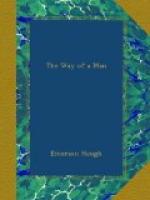“Sioux!” said Auberry, looking down as he leaned on his long rifle. “Not a wheel has crossed their trail, and I reckon the trail’s blocked both east and west. But the boys put up a fight.” He led us here and there and showed dried blotches on the soil, half buried now in the shifting sand; showed us the bodies of a half-dozen ponies, killed a couple of hundred yards from the door of the dugout.
“They must have shot in at the front till they killed the boys,” he added. “And they was so mad they stabbed the horses for revenge, the way they do sometimes. Yes, the boys paid their way when they went, I reckon.”
We stood now in a silent group, and what was best to be done none at first could tell. Two of our party were for turning back down the valley, but Auberry said he could see no advantage in that.
“Which way they’ve gone above here no one can tell,” he said. “They’re less likely to come here now, so it seems to me the best thing we can do is to lay up here and wait for some teams comin’ west. There’ll be news of some kind along one way or the other, before so very long.”
So now we, the living, took up our places almost upon the bodies of the dead, after giving these the best interment possible. We hobbled and side-lined our horses, and kept our guards both day and night; and so we lay here for three days.
The third day passed until the sun sank toward the sand dunes, and cast a long path of light across the rippling shallows among the sand bars of the Platte; but still we saw no signs of newcomers. Evening was approaching when we heard the sound of a distant shot, and turning saw our horse-guard, who had been stationed at the top of a bluff near by, start down the slope, running toward the camp. As he approached he pointed, and we looked down the valley toward the east.
Surely enough, we saw a faint cloud of dust coming toward us, whether of vehicles or horsemen we could not tell. Auberry thought that it was perhaps some west-bound emigrant or freight wagon, or perhaps a stage with belated mails.
“Stay here, boys,” he said, “and I’ll ride down and see.” He galloped off, half a mile or so, and then we saw him pause, throw up his hand, and ride forward at full speed. By that time the travelers were topping a slight rise in the floor of the valley, and we could see that they were horsemen, perhaps thirty or forty in all. Following them came the dust-whitened top of an Army ambulance, and several camp wagons, to the best of our figuring at that distance. We hesitated no longer and quickly mounting our horses rode full speed toward them. Auberry met us, coming back.
“Troop of dragoons, bound for Laramie,” he said. “No Indians back of them, but orders are out for all of the wagons and stages to hole up till further orders. This party’s going through. I told them to camp down there,” he said to me aside, “because they’ve got women with ’em, and I didn’t want them to see what’s happened up here. We’ll move our camp down to theirs to-night, and like enough go on with them to-morrow.”




